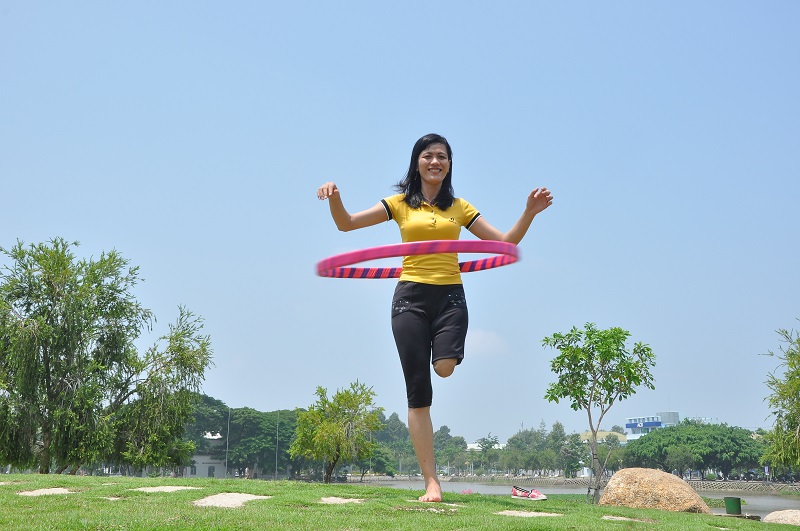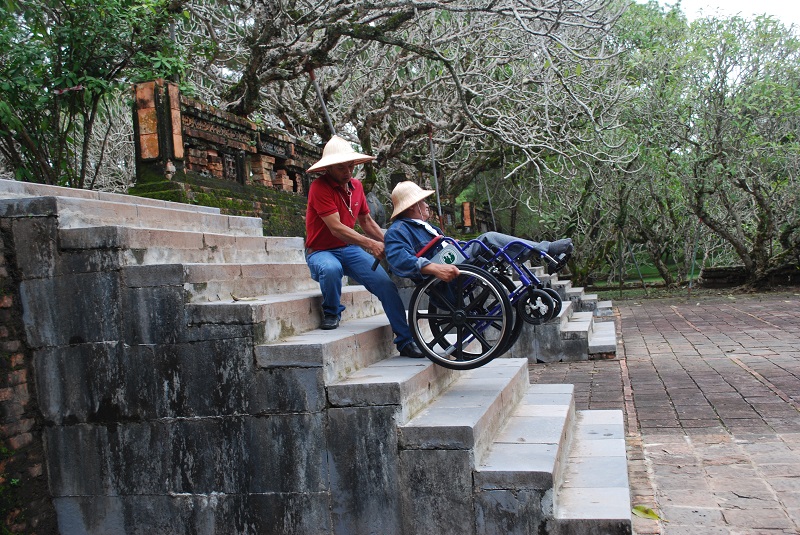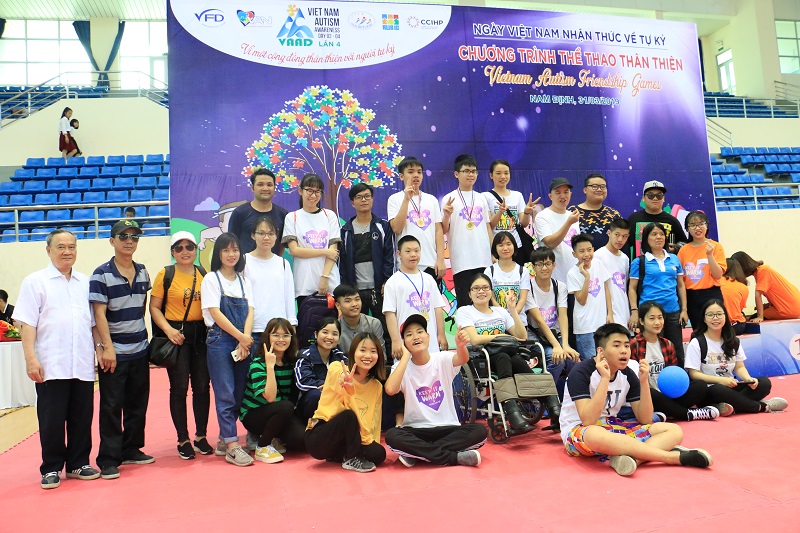Physical training and sports contribute to improving the health, fitness and stature of Vietnamese people, contributing to improving the cultural and spiritual life for the people, serving the cause of building and defending the Fatherland. Particularly for persons with disabilities, physical training and sports activities contribute to helping persons with disabilities support rehabilitation, training to improve health, life skills, enhance exchanges, learn experiences, confidently include into the community, and earn more income. In Vietnam, in order to encourage and encourage persons with disabilities to participate in physical training and sports activities and ensure that persons with disabilities regularly participate in sports, the State has gradually formulated, promulgated, and finalized legal policies related to physical training, sports for persons with disabilities.
Overview of some policies on persons with disabilities participating in sports activities
Persons with disabilities are entitled to participate in recreation, recreation and physical training and sports activities on the basis of equality as affirmed in the International Convention on the Rights of Persons with Disabilities, of which Viet Nam is the 118th member to sign the Convention on 22 October 2007[1]. Cons naming the provisions of the International Convention on the Rights of Persons with Disabilities and meeting the practical requirements of the country's development situation, up to now, Viet Nam has formed a basic legal framework on sports law policies for persons with disabilities. These policies are prescribed in many different legal documents from the Law to decrees, circulars guiding the execution, decisions of the Prime Minister, in which the focus is mainly on some important laws such as: Law on Physical Training and Sports 2006, amended and supplemented in 2018; Law on Persons with Disabilities 2010; Decision No. 1190/QD-TTg 2020 on approving the Disability Assistance Program for the period 2021-2030 and many detailed guiding documents.[2]
The policy on persons with disabilities participating in sports activities has been affirmed in Clause 1, Article 11 of the Law on Physical Training and Sports in 2006, amended and supplemented in 2018 to emphasize the development of physical training and sports for everyone, despite age, gender, health and disability levels, have the right to physical training and sports activities to improve health, recreation and recreation. In addition, the Law on Persons with Disabilities 2010 also emphasizes that persons with disabilities have the right to participate in sports in accordance with the form and extent of disability.
In addition, in Article 36, 37 of the Law on Persons with Disabilities in 2010 and Article 14 of the Law on Physical Training and Sports in 2006, amendments and supplements in 2018 stipulate a number of important contents such as:
- The State creates conditions for persons with disabilities to participate in physical training and sports activities in order to improve health and include into the community; ensure facilities and regulations and policies for disabled sports athletes to practice and compete in national and international sports tournaments;
- The State encourages organizations and individuals to support persons with disabilities to participate in physical training and sports activities;
- State management agencies in law on physical training and sports at all levels in coordination with socio-professional organizations in sports, relevant agencies and organizations to create conditions and guide persons with disabilities to participate in physical training and sports activities;
- Sports works must be appropriately designed for persons with disabilities to participate in physical training and sports activities;
- Physical training and sports activities of persons with disabilities are included into community cultural life, organized in a variety of types, meeting the needs of enjoying culture, physical training, sports and entertainment of persons with disabilities;
- National disability sports congress, sports tournament, art contest of persons with disabilities are organized in accordance with the characteristics and needs of persons with disabilities and socio-economic conditions.
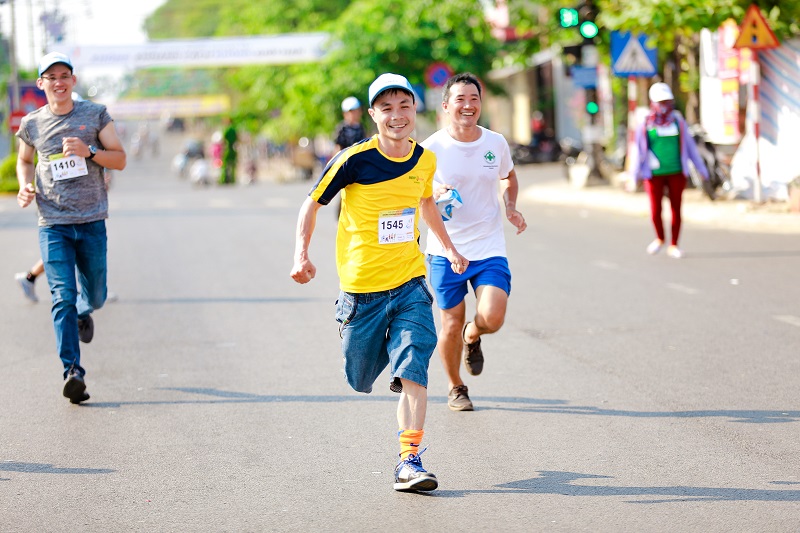
In order to put the above legal policies into practice, on August 5, 2020, the Prime Minister issued Decision 1190/QD-TTg 2020 on approving the Disability Assistance Program for the period 2021-2030 which clearly states the issue of supporting persons with disabilities in sports activities with the following target periods:
- In the period of 2021 - 2025: 80% of new constructions and 30% of old works are cultural and sport works to ensure accessibility for persons with disabilities; 50% of provinces/ cities have accessible sports clubs, attracting 10% of persons with disabilities to participate in physical training and sports.
- In the period of 2026 - 2030: 100% of new constructions and 50% of old works are cultural and sport works to ensure accessibility for persons with disabilities; 70% of provinces/ cities have accessible sports clubs, attracting 15% of persons with disabilities to participate in physical training and sports.
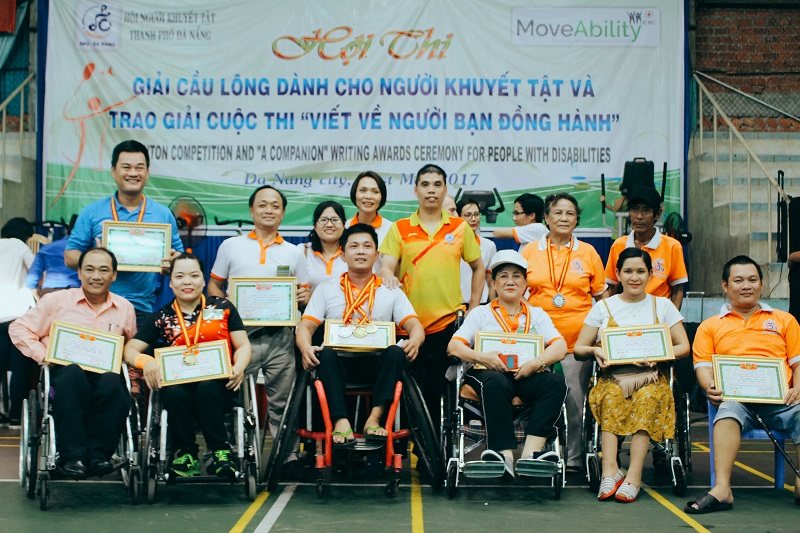
The main activities of the scheme in supporting persons with disabilities in sports activities are in Clause 9, Section II of Decision No. 1190/QD-TTg 2020 on approving the Disability Assistance Program for the period 2021-2030: (i) Guiding provinces and cities to establish and develop the system of disability sports clubs; (ii) To complete and develop 15 sports for persons with disabilities to practice and compete; (iii) To guide provinces and cities in directing the library system in the area to form a friendly reading environment, diversifying information services and products, libraries and conditions to support persons with disabilities; (iv)Enhancing the application of technology so that persons with disabilities can get information about tourist attractions, restaurants, hotels, vehicles and their access to persons with disabilities; (v) To formulate regime standards for persons with disabilities participating in domestic and foreign sports competitions; professional training of referees, coaches, doctors to examine the classification of injuries and athletes participating in tournaments; training in painting, music and poetry for persons with disabilities; professional training for specialized guides on skills and methods to support persons with disabilities when participating in tourism activities.
Some limitations
In general, along with the system of policies and laws to ensure the right to participate in physical training and sports activities of persons with disabilities has been formed relatively completely, the State has also gradually completed preferential policies dedicated to supporting and ensuring the participation of persons with disabilities in physical training activities. sport. In addition to the achievements, there is still an undeniable fact that legal policies have not been implemented effectively in practice, there are some shortcomings and limitations, barriers affecting persons with disabilities to participate in physical training activities, spacious sports:
Firstly, the infrastructure for persons with disabilities to have access to physical training and sports activities are still small, not meeting the actual needs.
According to information from the Conference to summary the disability assistance program for the period 2012-2020 and the implementation of the period 2021-2030, although the work of assisting persons with disabilities in sports activities has been carried out by the Ministry of Culture, Sports and Tourism, at all levels of government, departments and organizations, however, the results of implementation are limited, the percentage of persons with disabilities participating in sports activities is still low. This comes from many reasons, including the main reason is that the facilities of physical training and sports (yards, specialized equipment ,...) are mostly not available to serve persons with disabilities to participate in training; many localities are lacking, difficult to access or have no place/place for persons with disabilities to participate in sports. To date only 7.9% - 11.1% of provinces and cities have sports clubs for persons with disabilities and the trend has not increased over the years.
Specialized equipment for people with disabilities is lacking, asymable and not suitable for people with disabilities to practice (a part of the country has not been produced, the price of foreign markets is too high). The investment in the design, manufacture and manufacture of tools and equipment for cultural and sport activities for people with disabilities has not been given due attention, most of which are imported products and technologies from abroad. [3]
Secondly, the awareness of society and family is limited, not noticing the rights and abilities and roles of people with disabilities for families and communities. According to the Action Center for Community Development's 10-yearComparative Study report on stigma, discrimination, and awareness for persons with disabilities, although, family awareness of people with disabilities has also increased (after 10 years from 2009 to the end of 2019) instead of families treating people with disabilities as mortals, who bear the fate of the whole family, they now consider people with disabilities to be equal members like other family members, however this rate is still low at only 44%.[4]
Thirdly, the economic life of the vast majority of families with disabilities is still poor, so it is not enough for family members to participate in social activities for persons with disabilities. Under the 2016 multi-dimensional poverty access standard, households with disabilities were more than twice as likely to be at risk of poverty than non-disabled households (19.4% vs. 8.9%). There are differences in participation in social organizations or community living clubs of people with disabilities according to household living conditions for people with disabilities. Less than 1% of people with disabilities in poor households participated in community living clubs compared to 2.34% of people with disabilities in non-poor households.[5]
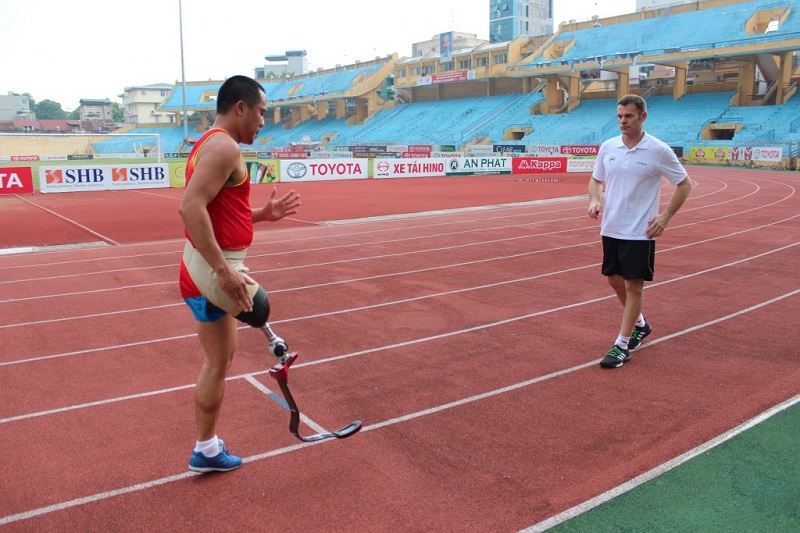
Finally, limited funding for physical training and sports activities exclusively for persons with disabilities. Our state has investment policies and encourages organizations, individuals participating in the development of physical training and sports for persons with disabilities, although in fact have achieved some achievements, but the organization of physical training and sports activities at the facility for persons with disabilities is limited, focusing mainly on large-scale events and activities serving a part of persons with disabilities who are highly capable of sports without serving a large number of persons with disabilities. The organization of contests, festivals, cultural festivals, arts and sports tournaments for persons with disabilities in localities is very difficult because of the limitations on funding and conditions of the organization and yard,[6] ...
Some suggestions
The above barriers, difficulties and limitations have been setting requirements for the Party and the State to have appropriate policies, there are many practical and effective solutions for persons with disabilities so that they can participate more in physical training activities. sport. Such as:
- It is necessary to have a master plan clearly stating the responsibilities of ministries, local branches, sports establishments, sports clubs to enhance the renovation and upgrading of infrastructure in accordance with national standards and strengthen inspection, supervision and ensure conditions for persons with disabilities to access works suitable to each type of disability;
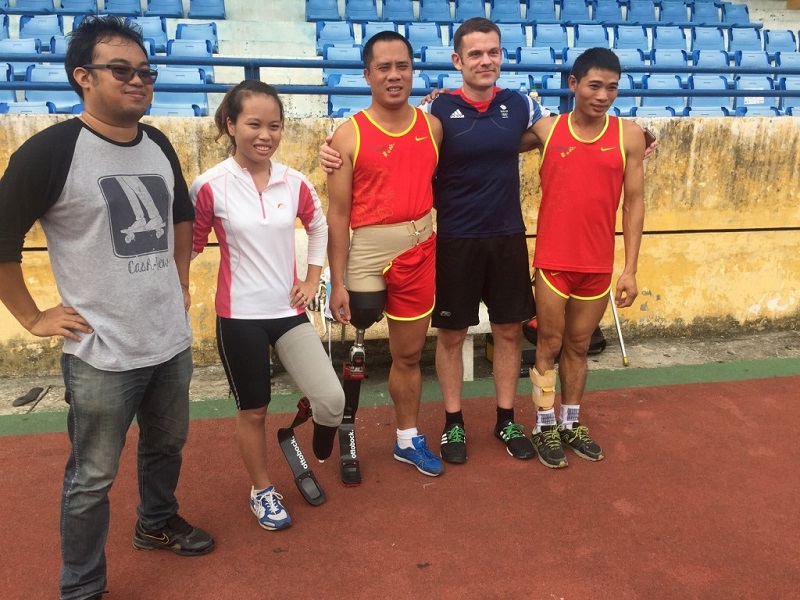
- Raising awareness and responsibilities of the whole society, especially for individuals and families of persons with disabilities as well as enterprises and public sectors participating in the implementation of legal policies for persons with disabilities, helping and supporting persons with disabilities to participate in physical training and sports activities;
- Have policies to invest resources to gradually close the gap in access to physical training and sports among persons with disabilities in urban and rural areas, especially persons with disabilities belonging to poor households;
- Enhancing physical training and sports programs for persons with disabilities living in remote or mountainous areas;
Note that the above solutions are only an open part of the overall solutions that we must implement in the near future. Implementing these solutions will contribute to the goal of policies to ensure the rights and encourage, promote, and support persons with disabilities to participate in physical training and sports activities effectively, thereby contributing to improving the physical and mental health of persons with disabilities, towards community inclusion and contributing to the development of society.
[1] See Clause 5 Article 30 of the International Convention on the Rights of Persons with Disabilities (CRPD)
[2] Currently, Vietnam has about: 02 Laws, 05 Decrees, 03 Circulars, 01 Directive and 01 Specific Decision on supporting persons with disabilities in physical training and sports activities, which can be mentioned as:
- Decree No. 28/2012/ND-CP guiding the Law on Persons with Disabilities;
- Decree No. 36/2019/ND-CP detailing a number of provisions of law amending and supplementing a number of provisions of the Law on Physical Training and Sports;
- Circular No. 18/2011/TT-BVHTTDL on the organization and operation of the local sports club promulgated by the Ministry of Culture, Sports and Tourism;
- Directive No. 03/2007/CT-UBTDTT on promoting the implementation of policies to support persons with disabilities in physical training and sports activities promulgated by the Minister and Chairman of the Committee for Physical Training and Sports.
[3] "Right to participate in sports activities of persons with disabilities", Vietnam Association for the Protection of Persons with Disabilities and Orphans, http://asvho.vn/quyen-tham-gia-hoat-dong-the-thao-cua-nguoi-khuyet-tat-a580.html, logged on April 12, 2021.
[4] Action to the community Development Institute, "10-year comparison of stigma, discrimination, and perception for persons with disabilities", https://acdc.vn/vi/bai-viet/431-so-sanh-10-nam-ve-ky-thi-phan-biet-doi-xu-va-nhan-thuc-doi-voi-nguoi-khuyet-tat.html?utm_medium=email&utm_source=getresponse&utm_content=B%E1%BA%A3n+tin+ACDC+s%E1%BB%91+75_T08.20_demo5+ok&utm_campaign=B%E1%BA%A3n+tin+ACDC, updated on 08/14/2020.
[5] General Statistics Office, Vietnam National Disability Census 2016, Statistics Publishing List, p. 148.
[6] Dr. Meng Thang Fee - MSc.Dao Trong Trong, " A number of issues raised in the development, promulgating and organizing the implementation of policies and laws for persons with disabilities", website of the Central Council of The theology, at: http://hdll.vn/vi/nghien-cuu---trao-doi/mot-so-van-de-dat-ra-trong-viec-xay-dung-ban-hanh-to-chuc-thuc-hien-chinh-sach-phap-luat-doi-voi-nguoi-khuyet-tat.html, published on 28/12/2020.




